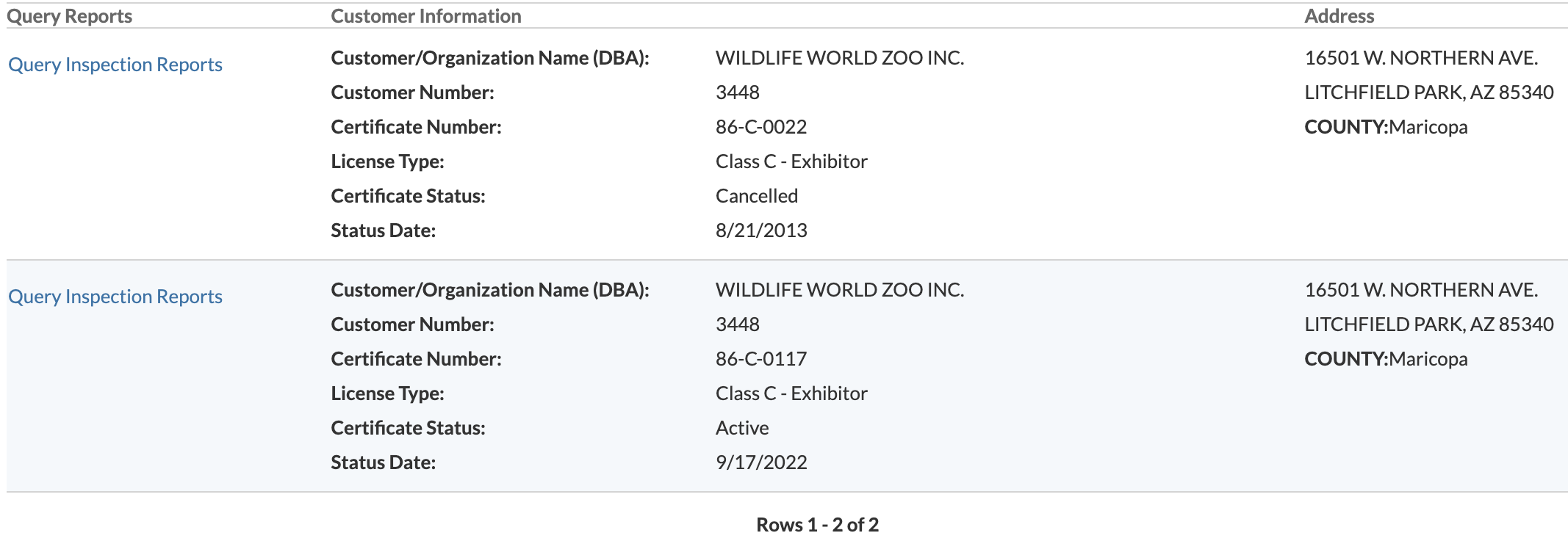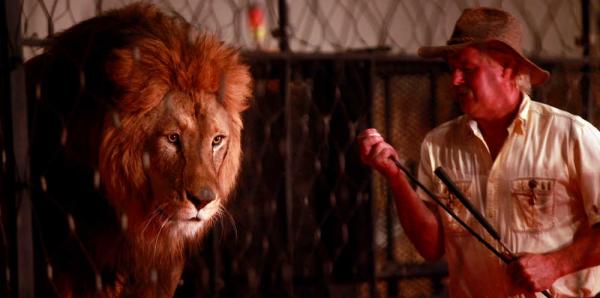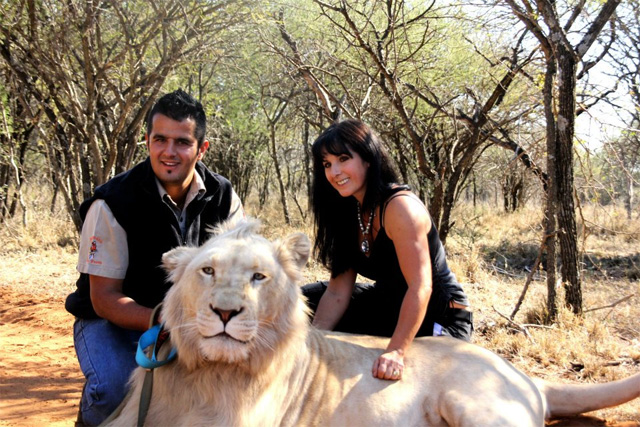Photo of Maverick, the tiger, in the animal sanctuary where law enforcement placed him. Handout / Federal Court records (Federal Court records / Courtesy)
The way the feds tell the story, when celebrity rapper Tyga wanted his very own tiger, he turned to a man known as “Nick the Wrangler” to illegally procure the big cat.
Tyga is not facing any criminal charges.
The investigation began in 2014 when, prosecutors say, Bishop used a fake name and falsified documents to purchase the tiger cub from an organization in Indiana. Investigators say that Bishop told them different versions of what happened when they interviewed him several months apart in 2014 and 2015.
Nicholas Bishop, aka ‘Nick the Wrangler’, 27, of Hallandale Beach, was arrested on federal allegations he illegally sold and transported a tiger, Maverick. Prosecutors said he told them the tiger was procured for well-known rapper, Tyga. (Handout/Broward Sheriff’s Office)
Bishop initially told investigators he paid $1,500 for the cub “at the request of” Tyga in March 2014.
Tyga’s legal name is Michael Ray Nguyen-Stevenson and he’s perhaps best known for dating Kylie Jenner, one of the stars of the reality show “Keeping Up With The Kardashians.”
Bishop told investigators he drove to Indiana, “purchased the tiger at the request of Tyga, and then drove with the tiger” back to where Bishop lived at the time, in Henderson, Nevada.
Bishop said he didn’t want to drive the animal to the rapper’s Los Angeles area home because he knew it was illegal, under California law, to possess a tiger without a permit.
Maverick, the tiger, photographed at an animal sanctuary in 2014. (Handout / Federal court records)“Tyga then took and drove the tiger from Nevada to the mansion that Tyga was renting in Calabasas, California,” investigators wrote in court records.
Bishop said he and Tyga had built cages for the tiger at the rapper’s house.
“Bishop also said that after Tyga had possessed the tiger for a ‘few months,’ Tyga was afraid of getting caught and asked some friends to ‘get rid of the tiger,’” investigators wrote.
According to Bishop, the rapper gave the tiger to a friend who lived in Ventura, about an hour north of Calabasas, in mid-April 2014.
Neighbors reported to law enforcement that the tiger briefly escaped from the friend’s house in the residential neighborhood in Ventura. The tiger was photographed, apparently unrestrained, in a backyard, according to court records.
Bishop said the Ventura friend then gave the tiger to two brothers who lived in Piru, Calif.
When law enforcement went to the Piru home, they found the tiger confined to a dog crate in a backyard shed.
Officers seized the tiger, Maverick, and moved him to a California tiger sanctuary where he has lived ever since.
After Bishop moved to South Florida , he was interviewed again by law enforcement in early 2015.
“Bishop now claimed that he had already been looking for a tiger, and that after he purchased one to keep as a pet, Tyga contacted him and offered him $30,000 to keep the tiger at Tyga’s house for several weeks,” according to court records.
Bishop also said he took a flight to Indiana and rented a minivan to drive the tiger back to Nevada, stopping off along the way to visit a friend in Arizona.
He said he later had a friend drive the tiger to Tyga’s house in California and left it there for several days before another friend drove the tiger to the Ventura home in the back of a Dodge Ram.
Bishop said Tyga paid him $2,000 to cover the tiger expenses.
In May 2014, Tyga told law enforcement he had no knowledge of the tiger.
When he was asked about photos that were posted online of him posing with tigers, he told investigators all those tigers were hired from contract companies.
He also said he was out of the country when the tiger was reportedly at his home and referred further questions to his attorney, according to court records.
Bishop is scheduled for a detention hearing on Wednesday in federal court in Fort Lauderdale. He has not yet indicated if he plans to fight the allegations.
The offense, aiding and abetting the purchase of a prohibited wildlife species, carries a maximum punishment of five years in federal prison.
http://www.sun-sentinel.com/local/broward/fl-reg-tyga-tiger-arrest-20171020-story.html
10/20/2017
Huge Bengal Tiger Seized by Feds Now Housed in San Diego County
A 450-pound Bengal tiger seized as part of a federal operation targeting wildlife smuggling is being cared for at an animal rescue facility in San Diego County, officials said Friday.
Wildlife In Need, Wildlife Indeed by a man who allegedly used false documentation to make the buy for a rapper friend, according to the U.S. Attorney’s Office.
Nicholas Bishop, also known as “Nick the Wrangler,” was arrested Thursday on federal charges of being involved in the illegal sale and transportation of the tiger that was seized from a home in Ventura County, prosecutors said.
The 27-year-old defendant was named in a criminal complaint filed late last month that charges him with the felony offense of aiding and abetting the purchase of a prohibited wildlife species. The state of California also prohibits the possession of tigers and other large cats, although certain licensed individuals and organizations have exceptions.
Bishop — who currently lives in Hollandale, Florida, but at the time of the offense lived in Henderson, Nevada — told investigators he purchased the tiger for Michael Ray Stevenson, a Compton rapper who uses the stage name Tyga, according to the U.S. Attorney’s Office.
In April 2014, the tiger was seen in a backyard in Ventura and reported to the state Department of Fish and Wildlife, which later located and seized the animal. Two people who possessed the tiger were convicted in state court, officials said.
When it was recovered, the tiger weighed about 100 pounds; it now weighs about 450 pounds, prosecutors said. Officials did not identify the San Diego County animal rescue facility that currently has the animal.
Federal officials announced the case Friday as part of Operation Jungle Book, a law enforcement initiative led by the U.S. Fish and Wildlife Service that resulted in criminal charges against defendants across the Southland.
Those facing charges allegedly participated in the illegal importation and/or transportation of numerous animal species — including monitor lizards, cobras, Asian “lucky” fish, exotic songbirds and several coral species.
“We are combating an ever-growing black market for exotic animals. An insatiable desire to own examples — both living and dead — of these vulnerable creatures is fueling this black market,” acting U.S. Attorney Sandra R. Brown said.
“This is a truly international problem that threatens the survival of iconic species and vulnerable animal populations,” she said. “The U.S. Attorney’s Office is prosecuting a wide array of cases that highlight the pervasive problem of wildlife trafficking and the associated issues of invasive species, disease transmission and the extinction of certain species.”
Some of the animals that were recovered are currently being cared for by the San Diego Zoo, Los Angeles Zoo, the Turtle Conservancy, and the STAR Eco Station.
‘Operation Jungle Book’ leads to federal criminal charges against suspected wildlife traffickers
Venomous king cobra snakes packed into potato chip cans. Asian songbirds bound and stuffed into a suitcase. And a Bengal tiger cub driven in a vehicle from Indiana to Ventura County.
These are just some of the ways people have smuggled protected wildlife into Southern California.
On Friday, U.S. Fish and Wildlife Service officials announced that 16 people have been charged and about 200 animals seized in recent months as part of “Operation Jungle Book,” the largest wildlife trafficking sweep in Southern California history.
“We are combatting an ever-growing black market for exotic animals,” acting U.S. Atty. Sandra R. Brown said in a statement. “An insatiable desire to own examples — both living and dead — of these vulnerable creatures is fueling this black market.”
The service held a news conference Friday at its Torrance facility to raise awareness and to try to deter wildlife smuggling. Operation Jungle Book also included trafficking in coral and bald eagle feathers.
Asst. U.S. Atty. Amanda Bettinelli, who worked on the investigative team, said authorities have seen a recent uptick in wildlife trafficking. Operation Jungle Book, which was conducted between May and early October, was an effort to crack down on such crimes.
The number of shipments of animals “we get on a weekly basis here in the Port of Los Angeles is pretty shocking,” Erin Dean, resident agent in charge of the service’s Southern California region, said. “It’s all about money.”
Despite the threat of prison time, smugglers take the risk because of a lucrative black market, authorities said.
In May, Kurtis Law, 50, of Orange County, was arrested on allegations of smuggling 93 Asian songbirds, worth nearly $100,000, on a flight from Vietnam, authorities said. Bound and stuffed into boxes in suitcases, only eight of the birds were still alive by the time they were discovered at Los Angeles International Airport.
This week, Law was ordered to serve one year in federal prison.
Gayle Simpson, 33, of Inglewood pleaded guilty last month to smuggling five monitor lizards, worth an estimated $1,500 to $2,000, from the Philippines. Authorities intercepted the package, which was addressed to Simpson’s son and labeled “speakers.” Two of the lizards were dead and another had a crushed foot.
Simpson faces a maximum penalty of 20 years in prison.
On Thursday, a Florida man was arrested on charges of falsifying documents to purchase a Bengal tiger from an Indiana wildlife sanctuary in 2014 and transporting it to Ventura. Nicholas Bishop, 27, who also goes by “Nick the Wrangler,” said he had bought the tiger for rapper Tyga.
The tiger cub, 3 to 6 months old at the time, was first spotted in a Ventura backyard, before it was moved to Piru, authorities said. The tiger had been held in a crate.
If convicted, Bishop faces a maximum sentence of five years in prison.
Protected Arowana fish were among the 200 confiscated animals from Operation Jungle Book. In one instance, authorities noticed a leaking package labeled “Porcelain Herbal Pots” and found eight of the fish in bags of water inside porcelain pots.
In some parts of Asia, the protected Arowana fish are thought to be symbols of luck and prosperity. They can fetch thousands of dollars in the underground market.
On display at Friday’s news conference were several confiscated animals (though not all were from Operation Jungle Book), including a hyacinth macaw, a ploughshare tortoise and two tiger cubs.
After their interception, confiscated animals are placed with accredited zoos and sanctuaries, such as the Los Angeles and San Diego zoos and the Turtle Conservancy in New York.




